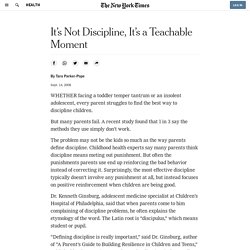

Operant Conditioning. Operant Conditioning in Disney Movies. < Video Reference. 4 Quadrants of Operant Conditioning. < Image Reference. Punishment. Positive and Negative Punishment. < Video Reference. Positive Vs Negative Punishment. < Image Reference. Reinforcement. Positive Reinforcement. < Video Reference. Negative Reinforcement. < Video Reference. It’s Not Discipline, It’s a Teachable Moment. WHETHER facing a toddler temper tantrum or an insolent adolescent, every parent struggles to find the best way to discipline children.

But many parents fail. A recent study found that 1 in 3 say the methods they use simply don’t work. The problem may not be the kids so much as the way parents define discipline. Childhood health experts say many parents think discipline means meting out punishment. < News Article Reference. Rewarding behavior is key to parenting teens, study suggests. Parenting is hard, and parenting teens brings about an entirely new set of challenges, from keeping their rooms clean to getting them home before curfew.

But, a new study suggests parents who want their teenagers to keep their grades up could have better success if they focus more on rewarding good behavior and less on threatening to punish the bad. According to the report, published in PLOS Computational Biology, British researchers have found that adolescents focus well on positive incentives, but have difficulty staying motivated to avoid penalties. The study shows that teens and adults learn in different ways, according to the study’s lead author Stefano Palminteri, a researcher with the Institute of Cognitive Neuroscience at University College London. It suggests that “in some cases positive feedback may have more of an effect than negative feedback on learning” in adolescents. “Rewards give them something they want to think about,” Allen said. < News Article Reference.